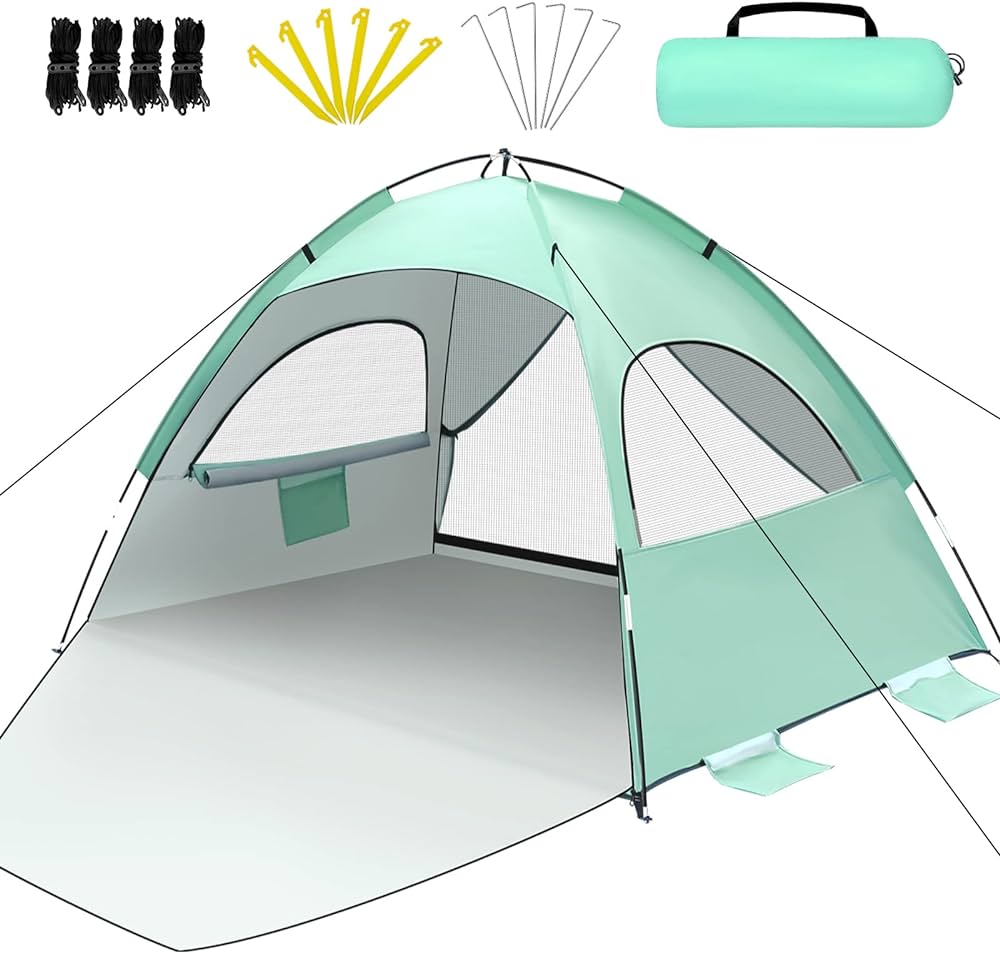Is There Any Such Thing As a Lightning Proof Tent? There is no such thing as a lightning-proof tent; tents do not provide protection from lightning strikes. Lightning can travel through tent poles and conductive materials, posing a risk of injury or death to anyone inside.
During a thunderstorm, being inside a tent does not offer adequate protection from lightning. Lightning-proof tents, while not completely possible, may use specific materials and design features to mitigate the risk of injury from lightning strikes. Camping enthusiasts often wonder if a tent capable of withstanding a lightning strike exists.
The concern arises from the potentially life-threatening risks associated with being in a tent during a thunderstorm. As it turns out, a lightning-proof tent is not a reality. When lightning strikes, it can travel through metal tent poles or conductive materials, posing dangers to individuals inside. However, while a completely lightning-proof tent might not exist, various materials and design features can help reduce the risk of injury from lightning strikes. Despite the lack of a truly lightning-proof option, the efforts to create safer camping solutions are ongoing.

Credit: www.nytimes.com
The Dangers Of Lightning Strikes
Unfortunately, there is no such thing as a lightning-proof tent. The tents do not provide adequate protection against lightning. Strikes, as the energy can travel through the metal tent poles or any conductive material, posing a risk of injury or death.
It’s important to seek proper shelter during thunderstorms to stay safe.
Understanding The Risks
Lightning strikes are a major concern for outdoor enthusiasts and campers, especially when considering the potential dangers when caught in a thunderstorm. Each year, thousands of people are affected by lightning strikes, with severe consequences including injury and even death.
Damage Caused By Lightning Strikes
Lightning strikes can cause catastrophic damage, from electrical surges that can damage electronic devices to potentially setting structures on fire. In the case of individuals directly struck by lightning, the consequences can be devastating, ranging from severe burns to cardiac arrest.
Why Tents Are Not Safe During Lightning Strikes
Many might assume that a tent provides adequate protection from the hazards of a lightning storm. However, this is a misconception. Tents, despite their covering, are not safe during lightning strikes. Lightning can travel through the ground, and any conductive materials, such as metal tent poles, pose a significant danger to anyone inside.
Moreover, while a building’s electrical wiring can safely channel electricity into the earth when struck by lightning, a tent or smaller shelter does not offer such protection. Consequently, seeking refuge in a tent during a lightning storm puts individuals at a high risk of injury or worse.

Credit: www.amazon.com
The Concept Of Lightning-Proof Tents
Regarding security in outdoor activities, the consideration of lightning strikes is a significant concern. The idea of a lightning-proof tent sparks curiosity among adventure enthusiasts and campers alike. While no tent can be entirely impervious to lightning, the concept of a lightning-proof tent revolves around utilizing specific materials and design features to minimize the risk of injury from a lightning strike.
Introduction To Lightning Proof Tents
Lightning-proof tents aim to provide a safer shelter option for outdoor enthusiasts during thunderstorms. Their design and materials are meticulously chosen to offer a level of protection against lightning strikes.
Exploring Materials And Design Features
Manufacturers of lightning-proof tents incorporate conductive fabrics, grounding systems, and innovative pole designs to mitigate the impact of lightning strikes. The materials used are selected for their ability to disperse electrical currents, whereas the design features focus on redirecting lightning energy away from occupants.
Limitations Of Lightning Proof Tents
Despite the advancements in technology and design, it’s crucial to understand that lightning-proof tents have limitations. They are not completely impervious to lightning and should not be considered foolproof protection during severe thunderstorms. While these tents may reduce the risk, there is no guarantee of complete safety.
Alternative Safety Measures
While it may not be possible to purchase a lightning-proof tent, alternative safety measures can be taken to protect oneself during thunderstorms, understanding the importance of proper shelter and utilizing portable lightning protection tools can significantly reduce the risk of injury or death from a lightning strike.
Tips For Staying Safe During Thunderstorms
- Stay indoors and avoid open areas such as fields, lakes, and beaches.
- Avoid using electronic devices, as they can attract lightning.
- Unplug appliances and avoid using landline phones.
- In a forest, seek shelter under shorter trees or low-lying areas.
- Wait at least 30 minutes after the last thunderclap before going outside again.
Understanding The Importance Of Proper Shelter
Proper shelter is crucial for protecting oneself from lightning strikes. While a tent may provide some protection from rain and wind, it does not offer adequate protection from lightning. Lightning can strike the ground and travel through the metal tent poles or any conductive material, potentially causing injury or even death to anyone inside.
Portable Lightning Protection Tools And Their Effectiveness
Portable lightning protection tools can be used to increase safety during thunderstorms. These tools, such as lightning rods or grounding straps, are designed to attract and safely divert lightning strikes away from people and structures. Although their effectiveness can be affected by factors like the size of the lightning strike and proximity to the struck area, they can provide an additional layer of protection.

Credit: newatlas.com
The Bolt Lightning Protective Tent
Experience camping like never before with the revolutionary Bolt Lightning Protective Tent. This tent is constructed with advanced features and functions to minimize the risk of injury from a lightning strike so as to ensure maximum safety and protection in thunderstorms. While no tent can be completely lightning-proof, the Bolt tent incorporates certain materials and design elements that greatly reduce the chances of harm. Let’s delve into the features and functionality of this groundbreaking camping gear.
Features And Functionality
The Bolt Lightning Protective Tent is crafted using cutting-edge technology and high-quality materials. Here are some of its key features:
- Advanced lightning protection system: The tent is equipped with a state-of-the-art lightning rod that safely channels electrical energy away from the tent. This helps to prevent lightning strikes from causing harm to the occupants.
- Durable yet lightweight construction: The tent is made from a special blend of durable, weather-resistant materials that are also lightweight for easy transportation.
- Reinforced frame: The tent’s frame is reinforced with strong metal poles that provide stability and structural integrity, ensuring it can withstand inclement weather conditions.
- Waterproof design: The Bolt tent features a waterproof outer layer that keeps you dry even during heavy rainfall.
- Spacious and comfortable interior: Despite its protective features, the tent offers ample space for you to relax and unwind after a long day of outdoor adventures.
Pros And Cons Of Using The Bolt Tent
Like any camping gear, the Bolt Lightning Protective Tent has advantages and limitations. Let’s examine the pros and cons:
| Pros | Cons |
|---|---|
| Enhanced safety during thunderstorms | No tent can be completely lightning-proof |
| Lightweight and easy to transport | It may be more expensive compared to standard tents |
| Durable construction for long-lasting use | Requires proper setup and maintenance for optimal protection |
| Waterproof design for protection against rain | It may not be suitable for extreme weather conditions |
| Spacious and comfortable interior for a relaxing camping experience |
In conclusion, while no tent can guarantee absolute protection from lightning strikes, the Bolt Lightning Protective Tent offers advanced features and functionality to reduce the risk of harm during thunderstorms greatly. Its innovative design and construction make it a reliable choice for campers who prioritize safety without compromising comfort.
Frequently Asked Questions On Is There Any Such Thing As A Lightning Proof Tent
Are There Lightning Proof Tents?
No, there are no lightning-proof tents. Tents do not provide sufficient protection from lightning strikes. The energy of a lightning strike can be. Discharged unevenly through the tent’s frame, potentially causing injury or death to anyone inside.
Can You Survive A Lightning Strike In A Tent?
A tent does not provide protection from lightning. Lightning can travel through metal tent poles and conductive materials.
Can A Tent Survive A Thunderstorm?
A tent may not survive a thunderstorm as it offers no protection from lightning strikes. Lightning can travel through metal tent poles, potentially causing injury or death.
How Safe Is It To Sleep In A Tent During A Thunderstorm?
It’s unsafe to sleep in a tent during the storm. Lightning’s capable of hitting the ground and traveling through it. The tent’s metal poles or any conductive material potentially causing injury or death. Tents do not provide adequate protection from lightning.
Conclusion
While the concept of a lightning-proof tent may be intriguing, the truth is that no tent can offer complete protection from lightning strikes. Even though being inside a tent during a thunderstorm may offer some shelter, it does not provide adequate protection from the dangers of lightning.
Lightning can travel through the tent’s metal poles or any conductive material, putting anyone inside at risk. While certain materials and design features can help mitigate the risk of injury, it is crucial to prioritize personal safety and seek proper shelter during a thunderstorm.

